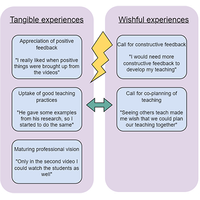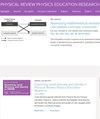Video clubs in physics teaching assistant training: Teaching assistants’ experiences
IF 3.6
2区 教育学
Q1 EDUCATION & EDUCATIONAL RESEARCH
Physical Review Physics Education Research
Pub Date : 2024-07-12
DOI:10.1103/physrevphyseducres.20.020101
引用次数: 0
Abstract
Teaching assistants have a very important role in physics education as they interact with students and guide them in different contexts. A multitude of research has focused on how to prepare teaching assistants to implement high-quality, research-based teaching techniques. Video clubs, i.e., working with a group of teachers to watch and discuss excerpts of videos recorded from their own teaching, is a novel approach to teaching assistant training that draws from teacher education. This study reports on the experiences of five physics teaching assistants as they participated in a semester long series of video clubs as a part of the implementation of a new introductory lab course. Data were collected through interviews (). The interview data were analyzed through reflexive thematic analysis. Five themes for the experiences were constructed from the data. Participation in the video clubs enabled the teaching assistants to uptake teaching practices from each other and spurred a wish for more coplanning of teaching. There was tension in the experiences as some teaching assistants appreciated the positive feedback but others would have preferred more constructive feedback. As the teaching assistants’ experiences were positive, the use of video clubs in teaching assistant training warrants more research. This research could focus on, e.g., the type of feedback the teaching assistants receive in the video clubs.

物理助教培训中的视频俱乐部:助教的经验
助教在物理教育中扮演着非常重要的角色,因为他们在不同的情境中与学生互动并引导他们。许多研究都集中在如何培养助教实施高质量的、以研究为基础的教学技巧上。视频俱乐部,即与一组教师一起观看和讨论他们自己的教学视频节选,是一种借鉴教师教育的新型助教培训方法。本研究报告了五位物理助教在参加为期一学期的视频俱乐部活动时的经历,该活动是实施新的入门实验课程的一部分。数据是通过访谈收集的(N=5)。访谈数据通过反思性主题分析法进行分析。从数据中构建了五个经验主题。参加视频俱乐部使助教们能够相互吸收教学实践经验,并激发了他们共同规划教学的愿望。一些助教对积极的反馈表示赞赏,但另一些助教则希望得到更多建设性的反馈,因此在这些经历中出现了矛盾。由于助教们的体验是积极的,因此在助教培训中使用视频俱乐部的做法值得进一步研究。研究重点可以是助教在视频俱乐部中获得的反馈类型等。
本文章由计算机程序翻译,如有差异,请以英文原文为准。
求助全文
约1分钟内获得全文
求助全文
来源期刊

Physical Review Physics Education Research
Social Sciences-Education
CiteScore
5.70
自引率
41.90%
发文量
84
审稿时长
32 weeks
期刊介绍:
PRPER covers all educational levels, from elementary through graduate education. All topics in experimental and theoretical physics education research are accepted, including, but not limited to:
Educational policy
Instructional strategies, and materials development
Research methodology
Epistemology, attitudes, and beliefs
Learning environment
Scientific reasoning and problem solving
Diversity and inclusion
Learning theory
Student participation
Faculty and teacher professional development
 求助内容:
求助内容: 应助结果提醒方式:
应助结果提醒方式:


